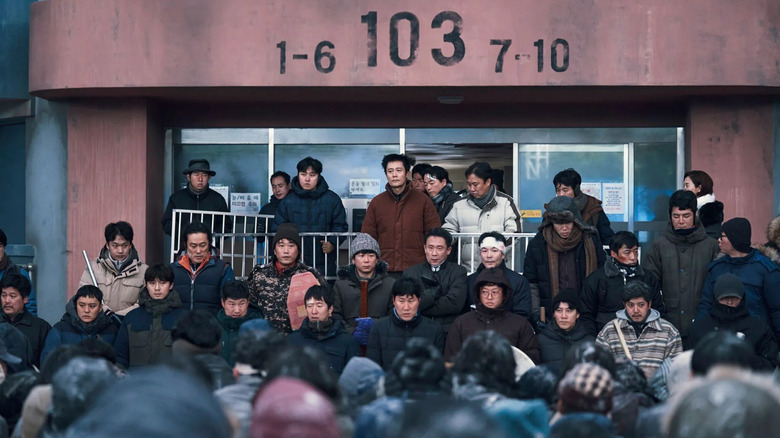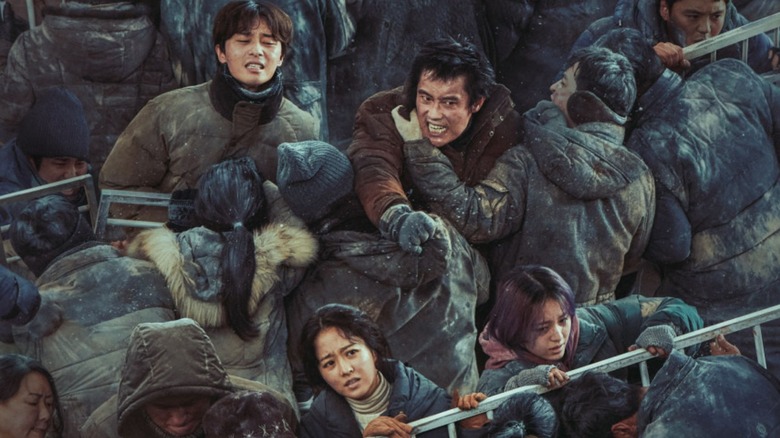Concrete Utopia Review: A Gripping Korean Disaster Movie [Fantastic Fest 2023]
Disaster movies tend to focus on the spectacle of the actual disaster, on the big explosions and debris, and on the sense of awe at seeing big-scale destruction. "Concrete Utopia" is not like that. Instead, director Um Tae-hwa focuses on what comes after the disaster, telling a compelling and gripping human drama about immigration and economic disparity, laying out an allegory for Korea's unique relationship with real estate and class.
Indeed, the first thing to know about "Concrete Utopia," which was announced as Korea's entry to the Oscars, is that the earthquake that decimates Seoul is barely seen. What little we do see of it looks stunning, the VFX work in the movie rather impressively creating an apocalyptic event that decimates the city — but that is not the focus of the film. Rather than build up to it or show us how people survive in the middle of the disaster, Um Tae-hwa and co-writer Lee Sin-ji show the aftermath, and then flashback to the moment of the earthquake to show how different characters reacted to it and how their demeanor changed due to the ordeal.
The plot follows the residents of the Hwang Gung apartment complex, the one place still standing upright in the city. Among the lucky survivors are nurse Myung-hwa (Park Bo-young) and her husband Min-sung (Park Seo-jun), a former civil servant. With hopes of rescue dwindling, the bitter cold starting to settle, and no means of contacting the outside world, the complex stands as a beacon of hope, and soon, mayhem, as each person's initial instincts and focus are twisted and turned violent.
A tale of survival
Things start taking a turn for the worse when Kim Young-Tak (Lee Byung-Hun) is elected delegate for the complex and decides to establish a policy that banishes every non-resident — essentially sentencing them to freeze to death. What follows is dog-eat-dog chaos.
Cinematographer Cho Hyoung-rae shoots the film with an eye for contrasts, order versus chaos, the warm colors of the inside of the apartments against the cold ash-grey colors of a ruined city. Everything outside the safety of the complex is cold, unforgiving, and muted, from the jackets to the corpses.
The script adapts the webtoon "Pleasant Bullying" by Kim Soongnyung but completely changes the perspective of the source material, which gives the movie a much bigger scope and an avenue to explore themes of inequality and class warfare. Though there are moments when it is clear that this is based on an episodic-format story, the tension never decreases.
"Concrete Utopia" mostly rests on the shoulders of the cast, with Byung-Hun and Seo-jun in particular stealing the show. The former delivers a layered performance unlike anything he's done before, mixing humor with menace, relatable desperation with insanity. The latter has a nuanced and compelling arc that sees him radicalized (not without reason) and slowly break apart as he experiences the worst the disaster has to offer.
"Concrete Utopia" is not subtle about its allegories, particularly when it comes to immigration. Thankfully, the focus on character and the fast pace of the story that moves us from one crisis to the other keep the message from becoming overwhelming. Likewise, the script and visuals tease a larger world with stories just outside of what is on screen, adding to the film's worldbuilding.
/Film rating: 8 out of 10

